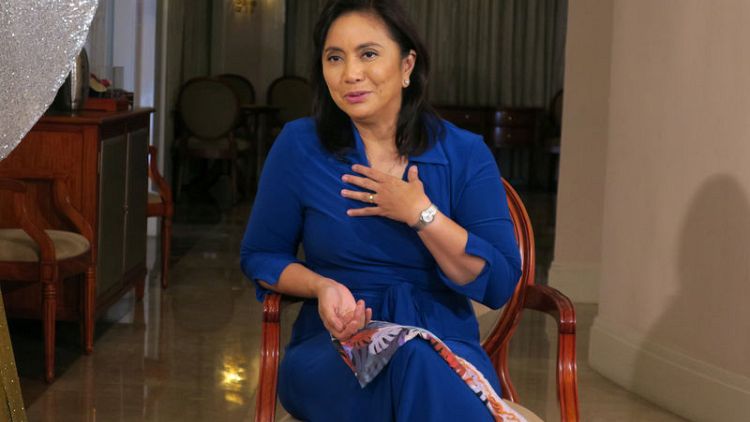By Martin Petty
MANILA (Reuters) - Philippine President Rodrigo Duterte should allow the United Nations to investigate his war on drugs, and abandon a deadly campaign that has been failure and a dent on the country's international image, its vice president said on Wednesday.
The crackdown has overwhelmingly targeted the poor rather than big drugs networks, Leni Robredo said in an interview, adding that Duterte's violent rhetoric was aiding a culture of police impunity for which international help should be sought if the government refused to change tack.
Robredo, who was elected separately to Duterte and has a frosty relationship with the president, said the thousands of people killed was already too many, with no evidence of a decline in drugs supply or usage.
"We ask ourselves, 'why is this still happening?'. The president has already made very serious threats to drug syndicates, to drug lords ... and yet it's still very prevalent, so obviously, it's not working," Robredo told Reuters.
"We have seen a lot of police that have abused their powers and not been penalised so this is where the International Criminal Court could come in, if we do not show the world that we can take care of our own mess."
She added: "The lives of our people are on the line and the dignity of our country is on the line, but my first call is for our government to take care of the mess."
The authorities reject activists' allegations that drug dealers and users are being executed and say the more than 7,000 people killed by police had all resisted arrest. Police say they have no connection to the mysterious murders of thousands more drug users.
Duterte is furious at a resolution in July by the United Nations Human Rights Council to investigate the bloodshed, and he last year withdrew the Philippines' membership of the ICC after it launched a preliminary examination into alleged crimes against humanity.
ISOLATE CHINA
Robredo, a former human rights lawyer who leads the opposition, said the government should take a tougher line with China over its activities in the South China Sea, or risk squandering the advantage of an international arbitration award that invalidated Beijing's sweeping sovereignty claims.
She said Duterte's argument that confronting China would lead to war was nonsense, and the Philippines would gain more from joining the United States, Australia and Britain in freedom of navigation exercises, and drafting conventions with claimants like Malaysia and Vietnam to try to isolate China.
"My question is, if China is really a friend, then why are they doing a lot of things that are a threat to our sovereignty and our territory?" Robredo said.
"We have such a gain to waste if we keep continuing with the narrative that we should not offend China."
Robredo, 54, is among more than 30 critics of Duterte who are facing possible sedition changes, which she described as baseless and attempts by the president's allies to crush dissent and create a climate of fear and authoritarianism not seen since the era of late dictator Ferdinand Marcos.
She would not be drawn on whether the legal moves were designed to remove her from the line of succession, amid growing concern about the health of Duterte, 74, who on Tuesday cut short a trip to Japan due to "unbearable pain" in his back.
Duterte this month revealed he had a rare neuromuscular disorder, on top of other ailments including Barrett's oesophagus, Buerger's disease and frequent migraines.
"It would be beneficial not just to the public but for the president as well to be very transparent as far as his health is concerned," Robredo said.
"The danger is the speculation would be worse than what is really there."
(Editing by Simon Cameron-Moore)
